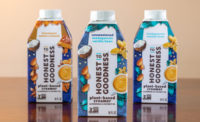
Just one in five Americans usually drink their coffee black, according to a 2022 YouGov poll. This poll found that 88% of American’s love or like regular coffee, perhaps with some whitener. But the percent who love or like their coffee with a generous amount of dairy or dairy alternative is 71% for cappuccino, 65% for mocha, 63% for latte, and 61% for Frappuccino.
Some consumers seek the rich indulgence of full cream, while others prefer a splash of nonfat milk to counter the natural bitterness of coffee. Vegans would never consider dairy milk, and younger consumers might turn to plant-based milks for sustainability or health reasons.
Coffee milk comparisons
Consumers at Starbucks can choose from six dairy options, ranging from nonfat milk to heavy cream, as well as four dairy alternatives: almond, coconut, soy, and oat. Plant-based dairy alternatives have exploded in popularity with baristas and coffee consumers. While almond milk continues to be the No. 1 refrigerated dairy alternative, its growth has stalled in favor of oat milk, which has grown in popularity, thanks to flavor and superior frothing.
While whole milk naturally produces a heady froth, plant-based alternatives can struggle with foaming, solubility and stability. OatyCrème overcomes these challenges by using hydrolyzed oats and microencapsulation technology to produce a vegan option without emulsifiers. Oaty-Crème comes in three different strengths: barista with 30% full fat, regular with 20% fat, and lite with 10% fat.
“Oats are an ancient grain known to support a healthy gut microbiome and contain bioactive compounds with antioxidant and anti-inflammatory properties,” said Rita Waintraub, product manager, Casey Ingredients, Inc., a supplier of OatyCrème.
Stability in ready-to-drink (RTD) coffee beverages can be an issue. Amano Enzyme’s protein glutaminase 500 (PG500) optimizes the mouthfeel of plant-based milks, promotes superior frothing, and allows them to stay creamy and not curdle or precipitate in coffee house and RTD applications.
One Australian company, MilkLAB, tailors its seven dairy and alternative milks to be the perfect complement to coffee. Their range includes full cream, lactose-free full cream, coconut, almond, soy, oat and macadamia. It is available in 1 liter containers for cafés and home baristas, and in 250 ml. minis for home use.
According to MILKLAB Master Barista, Hany, one in every four coffees is now being made with alternative milk. The freshness of cow’s milk affects taste and performance, as milk becomes harder to steam as it ages. Ultra-high temperature products allow for long shelf life.
Let’s compare the nutrition of the seven MilkLab products. Both dairy milks contain 8.3 grams of protein per cup (250 ml.). Soy, with 8.3 grams protein, is the only option that even comes close to the amount in real dairy. Coconut has 1.5, almond 2 g, macadamia 1.2, and oat 1.5 grams of protein. Higher fat options include full cream milk with 9, coconut 9.3, and soy 8.2 grams of fat. Lower fat options include oat 6.9, almond 6.1, and macadamia 4.7 grams of fat.
Many consumers seek natural products with fewer ingredients. Milk has just one, lactose-free milk has two (milk and enzyme), but almond and oat have 7, coconut 8, macadamia 12, and soy has 13 ingredients.
The FDA conducted a study, presented at Nutrition 2023, which found that almost all plant-based milks have lower amounts of four key nutrients: phosphorus, magnesium, zinc, and selenium, as compared to cow’s milk. On the flip side, plant milks, with the exception of coconut milk, are much lower in saturated fats, and may contain fiber. Some are fortified with calcium.
While most baristas and consumers refer to plant-based alternative as “milk,” the U.S. dairy industry continues to point out that plant-based alternatives do not meet the FDA definition of milk, and should use other nomenclature. In February 2023, the U.S. FDA issued draft guidance on labeling of plant-based milk alternatives, including the voluntary nutrient statement, “Contains lower amounts of [nutrient name(s)] than milk.”
The Swedish company, Oatly, recently prevailed in a four-year court battle against the British dairy industry over the use of the word “milk” on its packaging. Oatly, which offers shelf-stable, chilled, and barista varieties, launched two new products in 2024, an Unsweetened variety and a Super Basic Oat Milk with just four ingredients: oats, water, sea salt, and citrus zest fiber.
One factor limiting the growth of plant-based milk may be cost. In 2022, dairy milk increased 4% in price per volume, while plant milk increased 12%. Oat supply has been an issue in recent years, and may also limit growth potential.
Expect growth in RTD and cold coffee categories in 2024. Market innovation includes Blue Diamond’s new almond/oat milk blend, and McDonald’s new CosMc’s drive-through restaurant featuring a range of coffee beverages offering nonfat, 2%, whole milk, or almond milk options.




